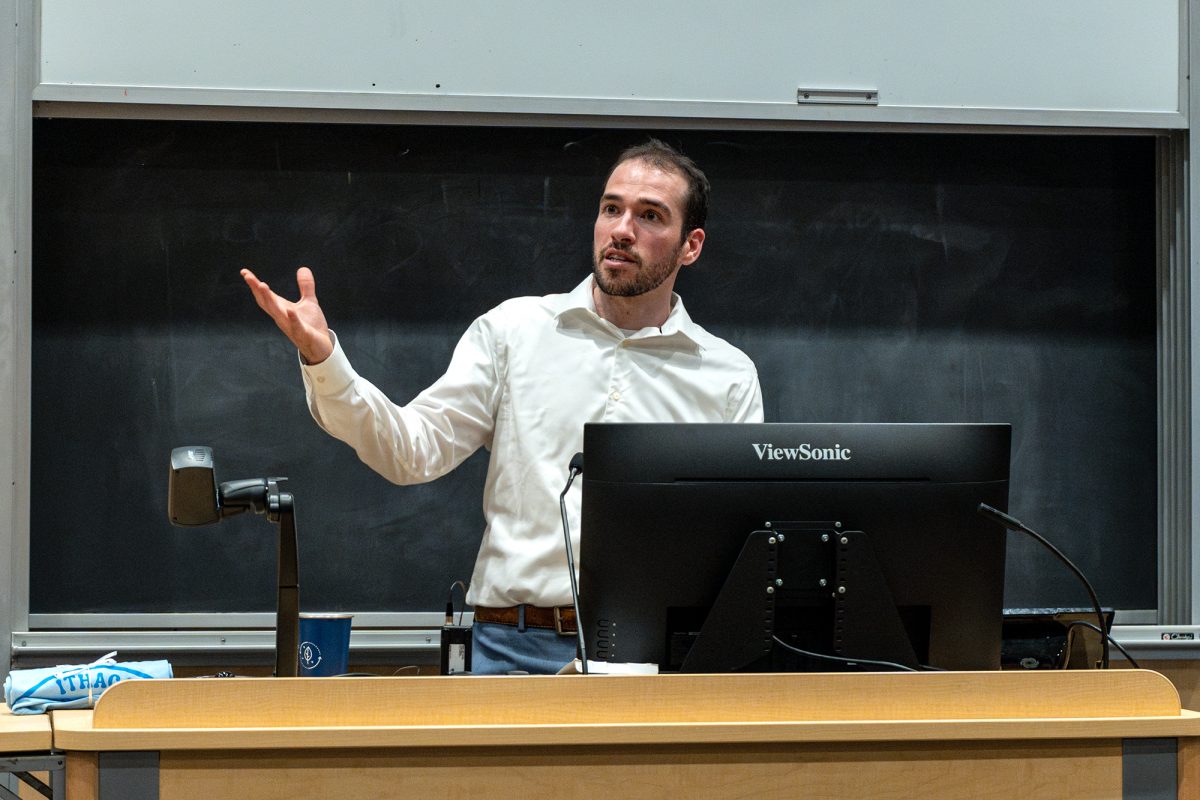Ithaca College hosted Sustainability Week 2025 from April 16-26. Throughout the week, there were different events including a sustainability fair, a talk with a local climate leader, a student-led colloquium, pancakes in the IC Natural Lands and clothing sales.
At the Sustainability Fair, different campus and community organizations showcased their work at tables that spanned the length of Textor Hall. Some of the organizations included Recycling and Materials Management of Tompkins County, Finger Lakes Climate Fund, South Hill Forest Products and Backyard Flea. Not only did they educate the campus on their specialties, but they also had raffles and products for sale.
Scott Doyle, director of Energy Management and Sustainability at the college, said that getting people involved at a community level is a step toward positive change, and that the sustainability fair has a way of bringing people from different backgrounds together.
“I helped [plan] the sustainability fair for the past two years, and it’s really fun,” Doyle said. “It’s a nice way to promote some of the stuff for the week. … We always get some good ideas talking to a community group that’s here or [a speaker] we set up.”
Doyle said Sustainability Week revolved heavily around student involvement, from conducting the student-led panel, presenting at the student work colloquium and tabling the Sustainability Fair.
Senior Julia Freitor tabled for South Hill Forest Products at the Sustainability Fair and its open house. This student-led company is run by the class, Farming the Forest: Non-Timber Forest Products. Everything at the open house, held April 26 in the Ithaca College Natural Lands, is produced and handcrafted by the students in the class. A non-timber forest product are products that are not pulp or paper, lumber or composite materials.
“I’m really proud of how much I’ve made for this open house,” Freitor said. “I learned to carve my own utensils out of wood, I got to learn how to make bark baskets, … and I designed stickers for the open house. … I just tried to get as hands-on as possible.”
Apart from student-led activities, Doyle said the college hosted professional advocates for renewable energy and local sustainability in hopes of inspiring and encouraging students and faculty to create a greener future.
Terry Carroll, chief sustainability officer for Tompkins County, was the keynote speaker for Sustainability Week. On April 24, Carroll presented “Sustainable Detours and Destinations: My Experience and the Road Ahead for Municipalities.” The presentation talked about his nonlinear career path to becoming a renewable energy advocate and his role in managing the Tompkins County Green Fleet program, where he is in charge of two hundred government-owned electric vehicles in Tompkins County.
“I oversee our vision for the community at large,” Carroll said. “We look at what programs we can do to help the community decarbonize, reduce their greenhouse gas emissions and … work on those individual programs.”
During the talk, Carroll said that clean energy was powering 40% of global electricity in 2024, and that despite any worries people may have about charging their vehicles, he has hope for them in the coming years.
“There’s more people today saying that their next vehicle is going to be electric than there’s ever been before,” Carroll said. “And even though we’ve seen some issues surrounding tariffs and uncertainty around incentives, you can see this trend line yet again increasing … how many [electric vehicles] are sold year over year.”
Michael Smith, professor in the Department of History, was an audience member at this event. During the Q&A, Smith said he is a big advocate of reducing motorized vehicles in general, even electric ones.
“I ride my bike almost exclusively as a way of commuting year-round unless there’s snow on the road,” Smith said. “There’s still so many side effects of automobility in terms of road construction and runoff and other issues. [It’s] not just emissions that make cars bad.”
Carroll’s talk raised questions on how communities can work to create more eco-friendly transportation systems and discussed how Tompkins County can be a leading municipality in sustainability, especially as a silver-certified climate-smart community.
Carroll said implementations alone are not enough and the best way to pave a greener future is to bring the topic of sustainability into everyday conversations, both on local and national levels.
“A lot of the efforts that we’re doing are great, but if no one knows about them, it doesn’t really mean anything in the long run,” Carroll said. “Our hope is to really inspire change by not only walking the walk but also talking the talk.”
The week provided a series of successful events that got people interested in discussing the climate of our planet and the importance of renewable energy sources. Doyle said he believes the success of conservation comes from the collaborative efforts of climate leaders, students, faculty and community members.
“[Local sustainability] is bigger than any individual or any individual entity,” Doyle said. “I think what this whole sustainability week is about is this connection of the community to celebrate the things we’re doing, but also good ideas for how to improve [things].”















Sarah Jane Evans • Apr 27, 2025 at 1:59 pm
Great article. Gets you thinking on what we can do on an individual level.
Daniel Burke • Apr 28, 2025 at 5:53 pm
I agree! Great stuff!